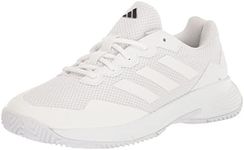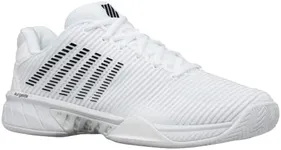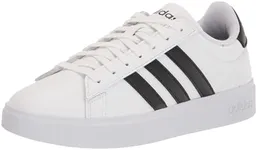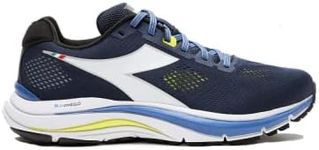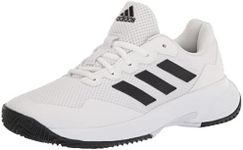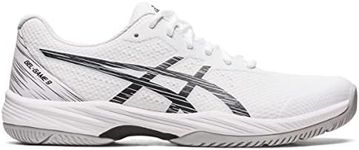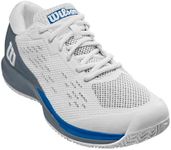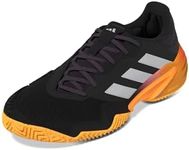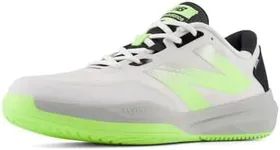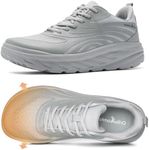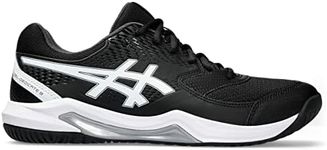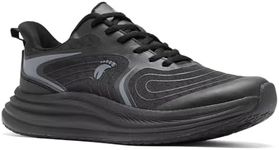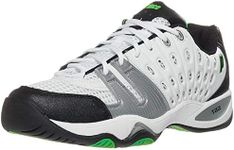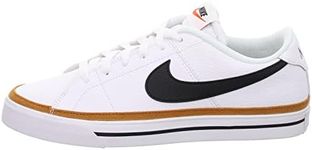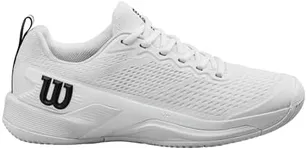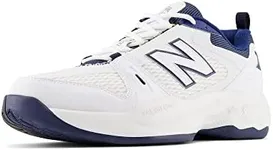Buying Guide for the Best Tennis Shoes For Men
Choosing the right tennis shoes is crucial for both performance and comfort on the court. The right pair can help prevent injuries, provide the necessary support, and enhance your overall game. When selecting tennis shoes, consider the type of court you play on, your playing style, and your foot type. Here are some key specifications to consider when picking the best tennis shoes for you.Court TypeTennis shoes are designed differently based on the type of court you play on: hard court, clay court, or grass court. Hard court shoes are durable and provide good support and cushioning. Clay court shoes have a herringbone pattern on the sole to prevent clay from clogging and to provide good traction. Grass court shoes have nubs or pimples on the outsole to grip the grass. Choose the shoe that matches the court you play on most frequently to ensure optimal performance and durability.
CushioningCushioning in tennis shoes helps absorb the impact of running and jumping, reducing stress on your feet and joints. Shoes with more cushioning are generally more comfortable and better for players who play long matches or have a history of foot problems. However, too much cushioning can reduce stability. If you are a player who needs extra support or has a history of injuries, look for shoes with ample cushioning. If you prefer a more connected feel to the court, opt for shoes with moderate cushioning.
Support and StabilitySupport and stability are crucial to prevent injuries, especially during lateral movements. Tennis shoes with good support have features like a sturdy upper, a firm heel counter, and a supportive midsole. Stability is often enhanced by a wider base and a lower-to-the-ground design. If you have a history of ankle injuries or need extra support, look for shoes with enhanced stability features. For players who prioritize speed and agility, a balance between support and flexibility is key.
DurabilityDurability refers to how long the shoes will last, especially under the stress of frequent play. Shoes with reinforced areas, especially in high-wear zones like the toe and outsole, tend to last longer. If you play frequently or are hard on your shoes, look for models known for their durability. For occasional players, durability might be less of a concern, and you can focus more on comfort and performance.
Fit and ComfortThe fit and comfort of tennis shoes are highly personal and can vary greatly between brands and models. A good fit means the shoe is snug but not too tight, with enough room in the toe box to wiggle your toes. Comfort is influenced by factors like the shoe's weight, the materials used, and the overall design. Try on different shoes and walk around to ensure they feel comfortable. If you have specific foot issues, such as wide feet or high arches, look for shoes that cater to those needs.
WeightThe weight of tennis shoes can affect your speed and agility on the court. Lighter shoes can help you move faster and feel less fatigued, but they might offer less support and durability. Heavier shoes typically provide more support and cushioning but can slow you down. If you prioritize speed and quick movements, opt for lighter shoes. If you need more support and cushioning, a slightly heavier shoe might be a better choice.
BreathabilityBreathability refers to how well the shoes allow air to circulate, keeping your feet cool and dry. Shoes with good breathability often have mesh panels or other ventilated materials. This is especially important if you play in hot conditions or tend to sweat a lot. If you prioritize comfort and want to avoid sweaty feet, look for shoes with good breathability. For cooler climates or indoor play, breathability might be less of a concern.
